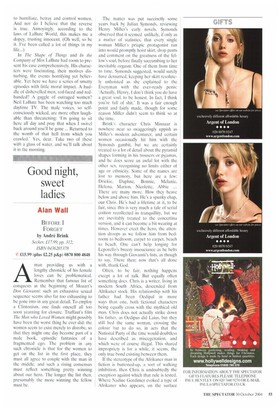Good night, sweet ladies
Alan Wall
BEFORE I FORGET by Andre Brink Seeker, £17.99, pp. 312, ISBN 0436205378 t £15.99 (plus £2.25 p&p) 0870 800 4848 Aman providing us with a lengthy chronicle of his female loves can be problematical. Remember that famous list of conquests at the beginning of Mozart's Don Giovanni: such an exhaustive sexual sequence seems also far too exhausting to be gone into in any great detail. To employ a Clintonism, one finds oneself all too soon yearning for closure. Truffaut's film The Man who Loved Women might possibly have been the worst thing he ever did: the women seem to exist merely to disrobe, so that they might one day become part of a male book, episodic fantasies of a fragmented ego. The problem in any such chronicle is that for the women to get on the list in the first place, they must all agree to couple with the man in the middle, and such a rising consensus must reflect something pretty winning about our hero. The longer the list then, presumably the more winning the fellow must be.
The matter was put succinctly some years back by Julian Symonds, reviewing Henry Miller's early novels. Symonds observed that it seemed unlikely, if only as a matter of statistics, that every single woman Miller's priapic protagonist ran into would promptly hoist skirt, drop pants and comment on the greatness of the fellow's soul, before finally succumbing to her inevitable orgasm. One of them from time to time, Symonds suggested, would surely have demurred, keeping her skirt resolutely unhoisted as she explained to the Everyman with the ever-ready penis: 'Actually, Henry, I don't think you do have a great soul, to be honest. In fact, I think you're full of shit.' It was a fair enough point and fairly made, though for some reason Miller didn't seem to think so at the time.
Brink's character Chris Minnaar is nowhere near so swaggeringly uppish as Miller's modern adventurer, and certain women occasionally hit him with the Symonds gambit, but we are certainly treated to a lot of detail about the pyramid shapes forming in his trousers or pyjamas, and he does score an awful lot with the other sex, recognising no limits either of age or ethnicity. Some of the names are lost to memory, but here are a few: Driekie, Daphne, Bonnie, Melanie, Helena, Marion. Nicolette, Abbie There are many more. How they heave below and above him. He's a spunky chap, our Chris. He's had a lifetime at it, to be fair, since this is very much a tale of serial coition recollected in tranquillity, but we are inevitably treated to the concertina version, and it can become a bit wearing at times. However erect the hero, the attention droops as we follow him from bedroom to bedroom, carpet to carpet, beach to beach. One can't help longing for Leporello's breezy insouciance as he belts his way through Giovanni's lists, as though to say, There then; now that's all done with, thank God.
Often, to be fair, nothing happens except a lot of talk. But equally often something does. Chris is a writer, living in modern South Africa, descended from Afrikaner stock. His relationship with his father had been Oedipal in more ways than one, both fictional characters being equally cross with the mythical old man. Chris does not actually strike down his father, as Oedipus did Laius, but they still bed the same woman, crossing the colour bar to do so, in acts that the National Party of the time would doubtless have described as miscegenation, and which were of course illegal. This shared impropriety is for a while, it seems, the only true bond existing between them.
If the stereotype of the Afrikaner man in fiction is buttoned-up, a sort of walking inhibition, then Chris is undoubtedly the exception against which that rule is tested. Where Nadine Gordimer evoked a type of Afrikaner who appears, on the surface anyway, to be thc image of repression incarnate, simultaneously untouchable and secretly lustful, and where Coetzee sometimes manages to portray sex with a punitive negativity which would surely have turned even Don Giovanni into a celibate, Chris learns from his early days that the joys of the flesh are definitely for him. Apartheid or no, all flesh is grass, and he is the lustful mower to the glow-worms.
We encounter him in old age, and the relationship that obsesses him now is with Rachel, a sculptor. She is married to the remarkably affable George, a photojournalist, who spends most of his time hurtling about the world's danger spots: Rwanda, the Congo, Somalia, Afghanistan. The invasion of Iraq and its reporting are a recurrent theme throughout the book, a backdrop to the (only just) platonic affair between older man and younger woman. George effectively appoints Chris the guardian of his wife while he's away on his shoots, and Chris readily agrees, though with a secret erotic obsession of which the husband is seemingly unaware. Many things are not quite what they seem here.
There is much talk of art and writing and music, and how they intertwine. The theme of Don Giovanni reappears in many long and philosophical conversations. None of these people carries the prejudices of the old South Africa. Chris once wrote a novel on the theme of the Sharpeville shootings. But as the old author recounts both to himself and to us his earlier loves, he tries to correlate the themes of apartheid and male violence with sexuality. The Iraq invasion is going on apace on the televison, and at one point this is described as George Bush's wet dream, which doesn't seem quite right somehow. As a concept it has Norman Mailer's healthy vulgarity without his undoubted linguistic punch.
Rachel is already dead at the beginning of the book. And since much of the novel is spoken to her, a great deal of the narrative is an address to a moribund woman, a refrigerated cadaver in a morgue. Leafing through the erotic anthology, and lamenting this last chaste love, now gone, his writing-block released at last by grief, Chris unburdens himself of all his cares and joys to us. Living women are his theme, dead women his present circumstance. A great deal of this is elegiac, but without much in the way of narrative thrust. There are occasional episodes which suddenly hold the attention, most of them entwined with tales of the earlier apartheid regime and its emotional and moral tangles, but the structure ultimately feels a little slack, and the attempts to connect the public and the private spheres are seriously strained. Sadly, this is not the best of Brink.



















































































































 Previous page
Previous page